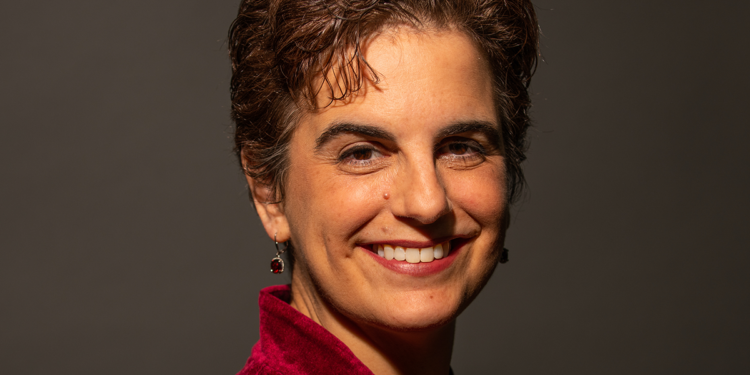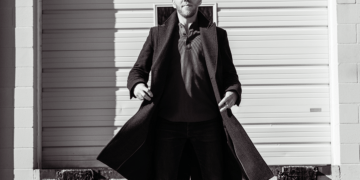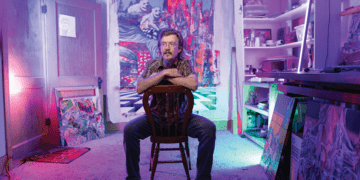For over 50 years, Omaha’s 90.7 KVNO has been broadcasting classical music programs, such as Saturdays with the Metropolitan Opera or Friday Favorites featuring cinematic movie scores. On October 21 of last year, KVNO celebrated its 50th anniversary with aplomb—premiering an original piece by renowned composer Stacy Garrop performed by the Omaha Symphony.
Garrop, one of the most accomplished freelance composers of her day, has written over 100 commissioned pieces for clients throughout the United States—from chamber choirs and symphony halls, to orchestras and opera theaters. She’s had notable works commissioned by the Pittsburg Symphony Orchestra, Chicago Opera Theatre, and the Grammy-nominated choir, The Crossing.
When KVNO deliberated on a high-profile composer to feature, Garrop immediately came to mind.
While negotiations with KVNO were underway, Garrop discovered a 41-year-old document while cleaning out a filing cabinet: an important piece of family history. Beyond vague ties to Eastern Europe, her father’s side of the family had remained mysterious. In a twist a fate, the document chronicled Berko’s—Stacy’s great grandfather—journey to Omaha.
Berko Gorobzoff (later changed to Garrop,) was a Jewish-Ukrainian immigrant to Omaha in 1904. He founded Garrop’s Grocery, where the Spielbound Board Game Café stands today.
During an executive meeting discussing the commission, Garrop mentioned this connection, noting immigration was at the forefront of the project’s vision and that she could expand on this theme through her own family’s experience. Garrop set to work, researching the perilous time period of Jews fleeing Ekaterinoslav.
“My family’s history is basically that of ‘Fiddler on the Roof,’ that was our story,” Garrop said. “They went through religious persecution.”
Situated on the limits of the Pale of Settlement—a region originally outlined by the Russian Empire for Jewish containment in 1791—Ekaterinoslav, now Dnipro, Ukraine, was a site of both industry and hardship for Russia’s Jewish population. In 1904, a year before the bloody Russian Revolution, Berko escaped the city across a backdrop of pogroms and Jewish persecution. Ultimately, Berko and his family found refuge in Omaha.
“We wanted something that would be a gift to Omaha,” affirmed KVNO station manager, Sherry Brownrigg. “The whole story behind it was that it was just a tribute to the history of Omaha really being made up of so many people from many other incredible melting pots that we have now. We still have so many immigrants coming in and finding their home in Omaha. We felt that really the whole thing was just a gift to Omaha.”
The Omaha Symphony, helmed by symphony director and maestro, Ankush Kamar Bahl, was excited to partner with KVNO on the project. Bahl had a distinct vision for this piece.
“For 50 years, KVNO has continued to provide locally composed and community supported classical music programming for the great Omaha region. Local classical radio stations like KVNO are rare and to show our gratitude for our longstanding partnership, we [were] excited to premiere a work by award-winning composer Stacy Garrop,” Bahl said. “I look forward to seeing this partnership continue to flourish for years to come!”
Berko’s Journey consists of three movements. The first, Leaving Ekaterinoslav details the harrowing journey of leaving the city as tensions rise between Jews and Russian proletariats. The second movement, In Transit, is a cinematic soundscape that places listeners aboard a locomotive—replete with train whistles—and an air of mixed relief and uncertainty as Berko travels westward. The third movement, At Home in Omaha, resonates with hope and new beginnings as Berko and his family arrive in, settle, and embrace their newfound community.
“Stacy is a programmatic composer where she tells a story,” Brownrigg noted. “It’s one of those pieces of music that you can see with your mind.”
“There’s chromaticism everywhere and dissonance,” Garrop said. “There is balance in the structure. At first you can’t see what the form is, it’s a skeleton…form is the most important musical parameter.”
A medley of instruments, from brass to wind ensembles, to a principal clarinet playing the lead as Berko, envelops listeners in a poignant musical sojourn—interweaving traditional Jewish folk songs and Klezmer music, such as the Miller’s Tears and Tumbalalaika, throughout. The lyrical composition explores the perils and triumphs of Berko’s flight.
In celebration of the 50th anniversary gala and longstanding legacy of classical music in Omaha, Berko’s Journey made its debut on the Scott Hall main stage at the Holland Center. The event consisted of two nights, with a performance Friday evening and a live broadcast of the work the following night. A pre-performance 30-minute presentation by Garrop was held as light hors d’ouevres were served.
Since its establishment in 1972, KVNO has continued to promote classical music in the metro. As a public station offering fine arts radio programming, it once partnered with other public stations such as NPR.
“We started out as just a radio station, but now we have a smart phone app, we stream from kvno.org, and we’re strengthening them and putting new things into them all the time,” Brownrigg said.
She hopes that radio and broadcast mediums can continue to reach the average person and inspire a love for the art form, even offering a respite for those feeling burdened by the humdrum of a negative news cycle.
“It’s like an oasis for people. It’s very accessible,” Brownrigg said. “From professors and doctors to truck drivers, it’s for everybody.”
Indeed, as Burko’s Journey illustrates through sound, Omaha is a city flush with opportunity—for classical music lovers, artists such as Garrop, and for those seeking a better life.
Visit garrop.com and kvno.org for more information.
This article originally appeared in the May 2023 issue of Omaha Magazine. To receive the magazine, click here to subscribe.













